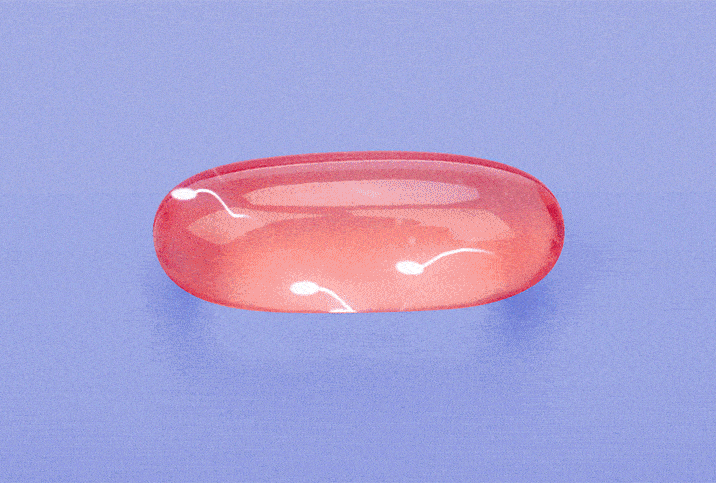Study: Male Fertility Supplements Shoot Blanks on Evidence

The maker of Conception Men fertility vitamins claims the clinically researched and lab-tested supplements support fertility and promote healthy conception.
Sounds good.
If you're a man struggling to conceive with your partner, you might jump at the chance to buy this product online via Amazon, Walmart or Google Shopping.
There is a problem, however. Manufacturer Eu Natural received a May 2021 warning letter about false advertising claims from the Food and Drug Administration (FDA) and Federal Trade Commission (FTC). The letter stated Conception Men is not generally safe and effective for the medical uses the company website claims; it constitutes a "new drug," which may not be introduced into the marketplace without FDA approval; and it is misbranded because the packaging does not include adequate directions for use.
This is a perfect example of the "buyer beware" world of online shopping. The growing supplement market only magnifies the risk. The FDA regulates dietary and sexual health supplements as food, not as drugs, so these pills do not go through the same rigorous clinical trials required to prove the safety and efficacy of medications.
'Just because a supplement has certain claims on the bottle or on the website doesn't mean that they're necessarily backed by real facts.'
Men facing infertility problems may be tempted to try a quick fix in the form of supplements, but doing so would be unwise, according to Petar Bajic, M.D., a urologist with the Cleveland Clinic. Product information in online advertising is not always easy to navigate and, in some cases, may be misleading.
"Just because a supplement has certain claims on the bottle or on the website doesn't mean that they're necessarily backed by real facts," Bajic said. "[Manufacturers] have no obligation to be truthful about what they put on those bottles, so it's always worth having that conversation with a doctor, somebody experienced in dealing with fertility, before considering implementing these supplements."
If you're considering supplements, you should research a product's safety, effectiveness and ingredients. Fortunately, a recent study published by the American Urological Association has done the work for you, but the results may be difficult to swallow.
What the study found
Research on supplements and their usefulness is relatively limited, Bajic said. Not many long-term, designed studies have been conducted showing that fertility supplements improve birth rates, which is obviously the goal.
The new study is a contemporary analysis of market research on male fertility supplements: what's out there, what ingredients are used, and whether truthful support exists for the manufacturers' claims, said Bajic, who moderated the presentation of the study in September 2021 at an AUA conference.
The authors of the study specifically examined the Amazon, Google Shopping and Walmart online marketplaces for male fertility supplements.
They concluded:
- Patients should be warned of the large number of male fertility products on the market that have little or no evidence of improving fertility and may increase costs for patients who may eventually require assisted reproductive technology (ART).
- Male fertility supplements include ingredients that have not been found to have the advertised effect or have never been tested in human trials.
The active ingredients were compared with known supplements included in randomized, controlled trials for subfertile men. Of the 73 ingredients reviewed, 58.9 percent have never been studied in human clinical trials on male infertility.
Among the 15 most common ingredients listed in online male fertility supplements, six are supported with evidence of improved sperm parameters: zinc, L-carnitine, selenium, coenzyme Q10, and vitamins E and C.
However, only zinc and vitamin E have evidence of improved conception rates, and in Bajic's opinion, more research is required to prove whether they're worthy of being included in a treatment regimen for couples.
More importantly, patients and doctors need to know whether supplements are safe before men try them. Without thorough testing, you can't be certain of the risks or your reactions to a supplement.

Do supplements have benefits?
Bajic acknowledged some fertility supplements may improve sperm counts and motility, or the ability of the sperm to swim, but that doesn't necessarily correspond to users actually conceiving as a result.
"I wouldn't make a blanket statement about whether I think they're necessarily good or bad," he said. "I think some supplements do have a role in certain scenarios, but for the most part, a lot of things that are advertised as being effective haven't really been proven to be so in a rigorous fashion."
Neel Parekh, M.D., a urologist and male infertility specialist with the Cleveland Clinic, routinely fields questions from patients about supplements. Unfortunately, many patients "self-prescribe" by buying readily available supplements on their own before being evaluated by a specialist.
"Sometimes, patients are taking way too high doses, well above what is recommended or what would be required," Parekh said. "Two, usually when they come in, they really haven't had any testing or any exam of any sort. They may be taking these vitamins, but they may have a medical condition or genetic issue or anatomical issue that's actually causing the fertility issues."
In other words, patients may be delaying important interventions to correct an underlying problem.
Parekh and his colleagues published a study in 2019 on male oxidative stress infertility (MOSI), a condition in which infertile men have high levels of oxidative stress, which occurs when unstable molecules called free radicals accumulate to levels that can damage or kill cells.
His study found antioxidants can be beneficial for these men. Antioxidants are substances found in foods and dietary supplements that may prevent or delay some types of cell damage. But not all infertility patients need antioxidants, and taking antioxidants when you don't need them can cause reductive stress, according to Parekh.
"A number of publications have shown that reductive stress can have a negative impact on semen parameters, so that's what we're trying to avoid," he said.
Men should get a semen analysis and have their oxidative stress levels checked—then their doctor would have a better idea of whether they would benefit from antioxidants.
For the appropriate patients, Parekh commonly prescribes three antioxidants in the hopes of reducing oxidative stress and improving sperm parameters: vitamin C, L-carnitine and coenzyme Q10.
Like Bajic, however, Parekh also believes more research is needed to determine the effectiveness of supplements.
"There haven't been any really good randomized, controlled trials looking at what actually works the best," he said.
The power of advertising
Some companies promote fertility supplements by citing studies showing they can improve sperm health, but they don't make the leap to promising conception. They might say the product "could result in a positive overall pregnancy outcome."
On Eu Natural's website, the Conception Men description includes statements such as:
- "Fertility-supporting extracts formulated to promote healthy conception."
- "Our science-backed formula promotes healthy sperm motility and strength to support a healthy conception."
- "We blend all our products at a cGMP Certified Laboratory to ensure strict FDA Standards." (CGMP stands for current good manufacturing practice.)
This type of advertising can be a tough adversary for doctors.
"The marketing is pretty good at kind of making everything seem pretty safe, no side effects, that sort of thing," Parekh said.
Eu Natural also includes a legal disclaimer on its website: "These statements have not been evaluated by the Food and Drug Administration and are not intended to diagnose, treat, cure or prevent any disease. There is no guarantee of specific results and that [sic] the results can vary. Consult your healthcare professional before taking any dietary supplement."
The FDA doesn't see it that way, however, warning Eu Natural for "illegally selling dietary supplements that claim to cure, treat, mitigate or prevent infertility and other reproductive health disorders."
As of October 2021, the Eu Natural case remained open, and the FDA does not comment on open cases, a spokesperson said in an email. Companies that do not correct citations in warning letters or fail to show that those citations are unfounded risk enforcement actions such as seizure, injunction or civil money penalties, the spokesperson said.
Vinay Amin, listed as president of Eu Natural in the FDA warning letter, could not be reached for comment; phone calls and emails to the company went unanswered.
Conception Men remained available for purchase in October 2021 through the sites for Amazon and Walmart, neither of which responded to email inquiries seeking comment about the ads.
Google Shopping pulled the product from its site sometime in October.
In an email, a Google spokesperson wrote: "Our goal is to provide a safe experience for consumers when they see ads. We have several policies related to pharmaceuticals, including outlining business requirements for selling medicines and prohibiting, among other things, product misrepresentation."
Amazon posts a disclaimer on its website that essentially advises consumers to read all labels and discuss supplements with a healthcare professional.
Walmart's disclaimer about product information reads, in part: "Manufacturers, suppliers and others provide what you see here, and we have not verified it."
The Google Shopping page doesn't appear to include a disclaimer but does give consumers the option to report products for legal reasons.
Who's regulating this stuff?

The FDA does not review and approve supplements, but it does regulate them for unwarranted claims or undisclosed, potentially harmful ingredients. Manufacturers are responsible for evaluating the safety and labeling of their products before marketing to ensure they meet FDA requirements. The FDA can take action against any adulterated or misbranded dietary supplement product after it reaches the market, according to its website.
There are more supplements than FDA-approved drugs on the market, but Bajic said the testing process for drugs may not be the best process for supplements. The process is very expensive, and many small and medium-sized manufacturers can't afford it. Secondly, the product has to be reliable and consistent in dosing and composition, which can be difficult to ascertain.
With the high number of supplements coming out regularly, Parekh doesn't think it would be feasible for the FDA to review and approve all of them, and prospective studies using clinical trials are often too time-consuming and expensive for even large companies to conduct for every product.
What you and your doctor should do
If you're concerned about infertility, get examined by a doctor or fertility specialist to identify any underlying or reversible causes. If you receive a normal evaluation and semen analysis, and your partner is working with a female fertility specialist, Bajic said it would be reasonable to discuss the use of supplements such as zinc, vitamin E and coenzyme Q10, which are known not to cause harm and have some support of efficacy.
"All we can do is share the information that we have available and kind of make an educated decision about whether or not that's something they want to do," Bajic said. "It's important to see somebody that's experienced dealing with supplements that might be pertinent to the male or the female."
Doctors can also counsel you on day-to-day habits, such as diet, exercise, weight, sleep and smoking, to naturally promote normal sperm production and quality.
"Anything that makes you healthier is going to make your sperm healthier," Bajic said.
Men are encouraged to involve a male fertility specialist early in the process and choose communication before supplements.
"Patients just need to be leery about all the ads, commercials, about quick fixes, miracle pills, and see a specialist if there's any concern for fertility," Parekh said.




















